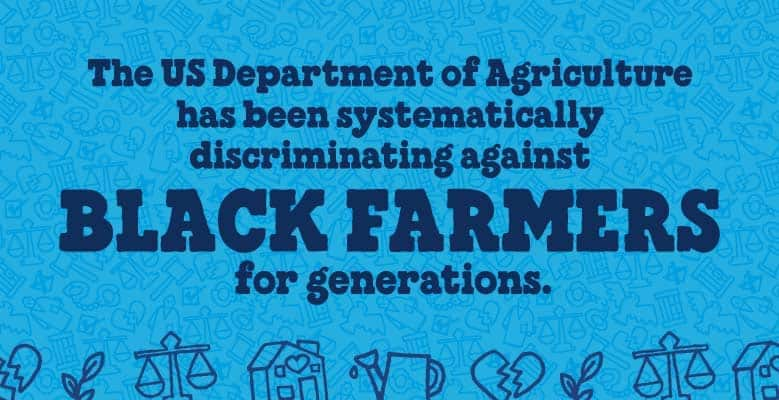March 10, 2021

The US Department of Agriculture has been systematically discriminating against Black farmers for generations. Over the past century and a half, racism in the USDA and in the programs it operates has driven many Black farmers off their land and out of business.
The historic $5 billion Emergency Relief for Farmers of Color Act just passed by the Senate (as part of the Biden administration’s $1.9 trillion COVID-19 relief package) represents a huge step forward in addressing that legacy of racism and mistreatment. It provides direct payments and 100% USDA debt relief to Black and Brown farmers, as well as $1 billion to combat systemic racism at the USDA.
But to really understand why this legislation is so important for the future of Black farmers in America, we first have to understand the past.
A History of Rampant Injustice
The USDA was created in 1862, when the majority of Black Americans laboring on farms were forced to do so as slaves. After the end of the Civil War, formerly enslaved people never received their promised “40 acres and a mule” (or, for that matter, much government assistance of any kind), but that didn’t stop Black farmers from buying their own land and getting to work. In fact, by the turn of the 20th century, former slaves or their descendants owned 14 million acres of land.
By the turn of the 21st century, about 90% of that land had been taken from them.
How did that happen? White supremacy and systemic racism played a big role, and still do. Legal loopholes have helped white landowners strip millions of acres of land from Black families (that’s a financial loss in the billions of dollars, a big contributor to the unacceptable racial wealth gap that persists in this country). In the Jim Crow South, lynchings and threats of violence drove many Black farmers from their land.
From the moment they first started buying land, Black farmers have faced discrimination by the local and federal government as well, especially at agencies like the USDA. Decade after decade, Black farmers have routinely been denied USDA loans and assistance that white farmers have ready access to, leaving them with much less money to finance farm operations and cover debts, which has led to the loss of thousands of farms.
A Century of USDA Discrimination: A Timeline
The National Black Farmers Association (NBFA) has put together a timeline of the USDA’s long history of discrimination against Black farmers to help us fully understand why legislation like the Emergency Relief for Farmers of Color Act is so critical today. Here are some highlights.
1920
There are almost a million Black farmers. They represent 14% of all US farmers.
1964
Black farmers represent 5.8% of all US farmers. Between 1950 and 1969, Black farmers lose about 6 million acres. Half a million Black-owned farms fail between 1950 and 1975.
1965-1998
Numerous reports (from the USDA, other government agencies, and independent groups) document rampant and ongoing discrimination against Black farmers and make it clear that the USDA has done almost nothing to stop it.
1983
President Reagan dismantles the USDA Office of Civil Rights.
1999
The settlement from the Pigford vs. Glickman lawsuit pays Black farmers $1.03 billion due to alleged USDA discrimination in providing loans and assistance.
2001-2008
More than 14,000 discrimination complaints are filed against the USDA. (The USDA decides that only one has merit.)
2017
Black farmers represent 1.7% of all US farmers (yet receive only 0.8% of USDA lending).
Reasons to Hope
Today Black farmers own only 0.52% of American farmland. They make, on average, less than $40,000 a year. Meanwhile, 95% of American farmers are white and make $190,000 a year. But thanks to groups like the National Black Farmers Association, awareness of this inequity is growing like never before. Since 1995, the NBFA and its founder, John W. Boyd, Jr., a fourth-generation Black farmer from Virginia, have been leading the fight for justice and amplifying the voices of those who for too long were ignored or silenced.
The landmark Emergency Relief for Farmers of Color Act passed the Senate, and will soon become law, because of the work of organizations like the NBFA—and because of the determined activism and advocacy of thousands of farmers who just want to stay on their land and keep doing the job they love. This legislation doesn’t come close to repairing all the damage done to Black farmers, families, and farm communities over the past century, but it is a significant and historic step in the right direction. It’s a signal that racism and discrimination will not be tolerated at the USDA or anywhere else. And the debt relief and direct payments will help Black farmers build a better future.
To learn more about Black farmers and the history of Black-owned farms in America, check out the NBFA website (and support their critical work). This is our moment to end systemic racism at the USDA and ensure that Black farmers not only survive, but thrive.
Recent Articles


